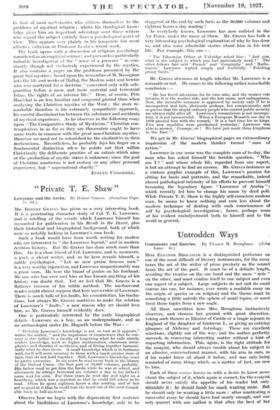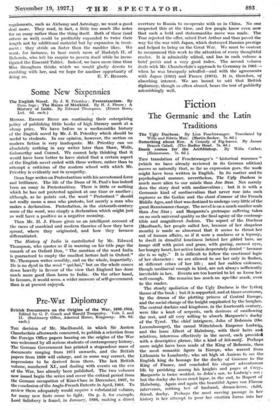Untrodden Ways
Comments and Queries. By Eleanor M. Brougham. (Jelin Lane: 5s.) Miss ELEANOR Baounnut is a distinguished performer on one of the most difficult of literary instruments, for the essay taxes the art of the writer . of prose precisely as the sonnet taxes the art of the poet. It mast be of a definite length, avoiding the treatise on the one hand and the mere " note " on the other, and must confine itself to one subject and even one aspect of a subject. Large subjects do not suit its small canvas (no one, for instance, ever wrote a readable essay on the origin of species or on religion) and the theme must be something a little outside the sphere of usual topics, or must treat those topics from a new angle.
, All these unwritten laws Miss Brougham instinctively observes, and chooses her ground with great discretion; taking such themes as Eleanor of Castile or a tragic sojourn in England of the daughter of Gustavus I., or giving as enticing glimpses of Alchemy and Astrology. These are excellent selections, slightly out of the way, and the author perfectly. succeeds in conveying interesting matter without a hint of imparting information. This, again, is the right attitude for the essayist, who should always ramble about his subject in an allusive, conversational manner, with his arm in ours; as if his reader knew all about it before, and was only being reminded of many things which, as a matter of fact, are new to him.
Each of these essays leaves us with a desire to know more about the subject of it, which again is correct, for the essayist should never satisfy the appetite of his reader but only stimulate it : he should finish his snack wanting more.- But he should only be wanting a little more : after masticating a successful essay he should have had nearly enough, and our• only quarrel with Our author is that after the best of her regalements, such as Alchemy and Astrology, we want a good deal more. They read, in fact, a little too much like notes for an essay rather than the thing itself. Both of these (and others as well) could be profitably expanded to twice their length not by additional material but by expansion in treat- ment : they stride on faster than the rambler hires. We want, for instance, to hear much more of - Rudolph II. of Bohemia, who left his empire to govern itself while he inves- tigated the Emerald Tablet. Indeed, we have more time than Miss Brougham thinks which we would gladly devote to rambling with her, and we hope for another opportunity of















































 Previous page
Previous page